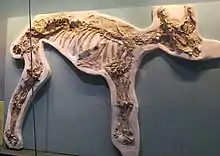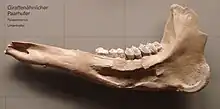Palaeomeryx
Palaeomeryx is an extinct genus of Artiodactyla, of the family Palaeomerycidae, endemic to Europe and Asia from the Miocene epoch, 16.9 – 7.25 Ma, existing for approximately 9.65 million years.[1]
| Palaeomeryx Temporal range: | |
|---|---|
 | |
| Fossil specimen, Tianjin Natural History Museum | |
| Scientific classification | |
| Domain: | Eukaryota |
| Kingdom: | Animalia |
| Phylum: | Chordata |
| Class: | Mammalia |
| Order: | Artiodactyla |
| Family: | †Palaeomerycidae |
| Subfamily: | †Palaeomerycinae |
| Genus: | †Palaeomeryx von Meyer (1834) |
Taxonomy

Fossil jaw
Palaeomeryx was named by von Meyer (1834). It is the type genus of Palaeomerycidae, Palaeomerycinae. It was assigned to Palaeomerycidae by Carroll (1988) and Sach and Heizmann (2001); and to Palaeomerycinae by Prothero and Liter (2007).[2][3][4]
Fossil distribution
- Amor, Leiria, Portugal
- Level C1, Quarry Quebra Bilhas, Lisbon, Portugal
- Buñol, Valencia, Spain
- Lufeng, Yunnan Province, China
- Kryvyi Rih, Ukraine
References
- "Fossilworks: Palaeomeryx". Archived from the original on 2016-08-13.
- R. L. Carroll. 1988. Vertebrate Paleontology and Evolution. W. H. Freeman and Company, New York 1-698
- V. J. Sach and E. P. J. Heizmann. 2001. Stratigraphy and mammal faunas of the Brackwassermolasse in the surroundings of Ulm (Southwest Germany). Stuttgarter Beiträge zur Naturkunde, Serie B (Geologie und Paläontologie) 310:1-95
- D. R. Prothero and M. R. Liter. 2007. Family Palaeomerycidae. in D. R. Prothero and S. Foss (eds.), The Evolution of Artiodactyls 241-248
This article is issued from Wikipedia. The text is licensed under Creative Commons - Attribution - Sharealike. Additional terms may apply for the media files.